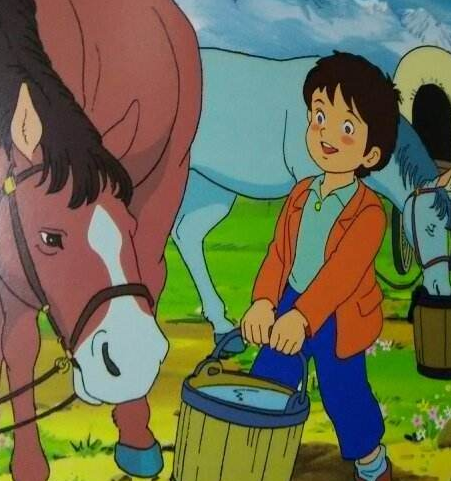His heart was breaking. He fell ill; for three days he remained in the wagon, with a coverlet over him, fighting a fever, and seeing no one except the capataz, who came to give him his drink and feel his pulse. And then he believed that he was lost, and invoked his mother in despair, calling her a hundred times by name: "O my mother! my mother! Help me! Come to me, for I am dying! Oh, my poor mother, I shall never see you again! My poor mother, who will find me dead beside the way!" And he folded his hands over his bosom and prayed.
他心要碎了,終于大病,連發(fā)了三日的熱,拉些什么當(dāng)做被蓋了臥在車?yán)铩3邦^腦’有時來遞湯水給他或是替他按脈搏外,誰都不去顧著他。他自以為快死了,反復(fù)地叫母親:“母親!母親!救救我!快到我這里來!我快要死了!母親啊!不能再見了啊!母親!我快要死在路旁了!”他將兩手交叉在胸前祈禱。
Then he grew better, thanks to the care of the capataz, and recovered; but with his recovery arrived the most terrible day of his journey, the day on which he was to be left to his own devices. They had been on the way for more than two weeks; when they arrived at the point where the road to Tucuman parted from that which leads to Santiago dell'Estero, the capataz announced to him that they must separate. He gave him some instructions with regard to the road, tied his bag on his shoulders in a manner which would not annoy him as he walked, and, breaking off short, as though he feared that he should be affected, he bade him farewell. The boy had barely time to kiss him on one arm. The other men, too, who had treated him so harshly, seemed to feel a little pity at the sight of him left thus alone, and they made signs of farewell to him as they moved away. And he returned the salute with his hand, stood watching the convoy until it was lost to sight in the red dust of the plain, and then set out sadly on his road.
從此以后,病漸減退,又得了“頭腦”的善遇,遂恢復(fù)原狀。病雖好了,這旅行中最難過的日子也到了。他就要下車獨自步行。車行了兩星期多,現(xiàn)在已到了杜克曼和山契可·代·萊斯德洛分路的地方。“頭腦”說了聲再會,指了路徑,又替他將在包擱在肩上,使他行路便當(dāng)些,一時好像起了憐憫之心,接著即和他告別,弄得瑪爾可想在“頭腦”手上接吻的工夫都沒有。要對那一向虐待他的人夫告別原是痛心的事,他們也都舉手回答。到走開的時候也一一向他們招呼,瑪爾可目送他們一隊在紅土的平野上消失了,才蹣跚地獨自登上旅程。

One thing, on the other hand, comforted him a little from the first. After all those days of travel across that endless plain, which was forever the same, he saw before him a chain of mountains very high and blue, with white summits, which reminded him of the Alps, and gave him the feeling of having drawn near to his own country once more. They were the Andes, the dorsal spine of the American continent, that immense chain which extends from Tierra del Fuego to the glacial sea of the Arctic pole, through a hundred and ten degrees of latitude. And he was also comforted by the fact that the air seemed to him to grow constantly warmer; and this happened, because, in ascending towards the north, he was slowly approaching the tropics. At great distances apart there were tiny groups of houses with a petty shop; and he bought something to eat. He encountered men on horseback; every now and then he saw women and children seated on the ground, motionless and grave, with faces entirely new to him, of an earthen hue, with oblique eyes and prominent cheek-bones, who looked at him intently, and accompanied him with their gaze, turning their heads slowly like automatons. They were Indians.
旅行中有一事使他的心有所安慰。在荒涼無邊的荒野過了幾日,前面卻看見高而且青的山峰,頂上和阿爾卑斯山一樣地積著白雪。一見到此,如見到了故鄉(xiāng)意大利。這山屬于安第斯山脈,為美洲大陸的脊梁,南從契拉·代爾·費俄,北至北冰洋,像連鎖似的縱直看,南北跨著一百十度的緯度。日日向北進(jìn)行,漸和熱帶接近,空氣逐步溫暖,也使他覺得愉悅。路上時逢村落,他在那小店中買食物充饑。有時也逢到騎馬的人,又有時見婦女或小孩坐在地上注視他。他們臉色黑得像上一樣,眼睛斜豎,額骨高突,都是印第安人。











